Who's paying for insurance scams? - Some insurance companies increase prices to cover loss to false claims
An upward trend in personal-injury claims from motor vehicle accidents over the past seven years has the Insurance Association of Jamaica convinced that scamming is on the upswing.
"Certainly, there was a significant increase in terms of the number of personal-injury claims and in the number of suspected fraud associated with personal-injury claims arising from motor vehicle accidents," vice-president of the Insurance Association of Jamaica, Peter Levy, told The Sunday Gleaner, as he noted that the dramatic increase started around 2008.
"It is estimated that anywhere between 15 and 25 per cent of total claims are fraudulent claims, and that is an industry standard, not specific to Jamaica," added Levy.
He said insurance companies have experienced a major reduction in profitability and a significant underwriting of losses as a result of the increase in payment that has occurred, with persons not involved in fraudulent activities being asked to foot some of the bill.
"Unfortunately, to the extent that fraudulent claims do occur and we are unable to prove them to be fraudulent, we ultimately have to collect premium to pay for them the same way we do every other claim, and so it does have an impact on the ordinary consumers and innocent consumers have to pay," said Levy, who is also managing director of British Caribbean Insurance Company.
"A number of insurance companies have taken remedial action which includes increasing prices, but also being a bit more proactive with their claims investigation and claims litigation handling practices. So we are very conscious of that and we have a number of initiatives to try and make it more difficult for that activity to take place."
While serving as head of the Police Traffic Division, then Senior Superintendent Radcliffe Lewis had charged that the police were aware of the insurance scams, and that preliminary investigations had indicated that "several prominent lawyers and doctors were involved".
Levy, while not dismissing the possible involvement of some medical practitioners, pointed out that the fraudulent claims can be made without a doctor wilfully supplying a misleading medical certificate.
VERIFYING CLAIMS
"These claims are usually presented as what they call soft tissue claims, which means that they do not leave a physical trace that is detectable by X-rays or any other kind of diagnostic tool," said Levy.
"The diagnosis is based on the symptoms, so a properly coached individual can make an orthopaedic surgeon believe that they are suffering from a genuine injury.
"What we see is sometimes the same medical professional's name coming up over and over again, and it makes us think that at best their examinations are perhaps not as in-depth and complete, which is why they are being used for this purpose."
In the meantime, president of the Medical Association of Jamaica, Dr Shane Alexis, is making it clear that any doctor found to be engaging in insurance scam would be on their own.
"We would not defend anyone, nor would we encourage behaviour that is either illegal or unethical and would recommend persons to refer such matters to either the Medical Council of Jamaica, which is the licensing body, in writing, or to the police for further investigation," Alexis told The Sunday Gleaner.
"That would be fraud and it is completely illegal, and that would be a criminal matter."

